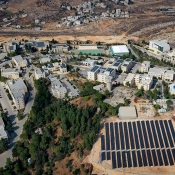Birzeit University to lead development of risk analysis research project
“Throughout this ongoing effort, I kept thinking ‘What’s the best for Birzeit University?’” said the Professor of Civil and Environmental Engineering at the University of Maryland, College Park Dr. Bilal Ayyub.
The Palestinian-born professor, who is also the director of the Center for Technology and Systems Management at the University of Maryland’s A. James Clark School of Engineering, earned his bachelor’s degree in civil engineering from Kuwait University and his master’s and Ph.D. degrees from the Georgia Institute of Technology.
Between leading breakthrough research on risk analysis and systems engineering and teaching at the University of Maryland, Professor Ayyub paid a visit to Birzeit University’s campus in 1996, the first of three that he would make in the coming years. This visit planted the seed for what would be the basis for his latest visit to Birzeit: a unique, data-driven risk analysis research project that would combine the experiences of Birzeit University and the University of Maryland, with plans for a greater expansion across the region.
“This project would bring together the Palestinians’ great capabilities and the knowledge and skills of the University of Maryland’s experts. What we are trying to build is a data hub, a project that would drive research and innovation in data-driven analysis in general, particularly for risk management,” said Professor Ayyub.
“Currently, data are arguably the world’s most valuable resource,” added the Professor. “We are witnessing an explosion of data from sensors, computers, smartphones, machines, airplanes, etc. With the proper analytics, we can turn this huge amount of data into useful information that can be utilized in making decisions that would guarantee the best outcome.”
Professor Ayyub met with faculty members from Birzeit University’s Engineering and Technology and Science Faculties, and together they explored ways to incorporate students and members of their respective faculties in the upcoming project.
“That the project is in its earliest stages is true, but we do have some very high expectations. This is our attempt at finding common grounds between cutting edge technology and great potential. The resulting research project would constitute a model for all the region to follow,” concluded Professor Ayyub.







